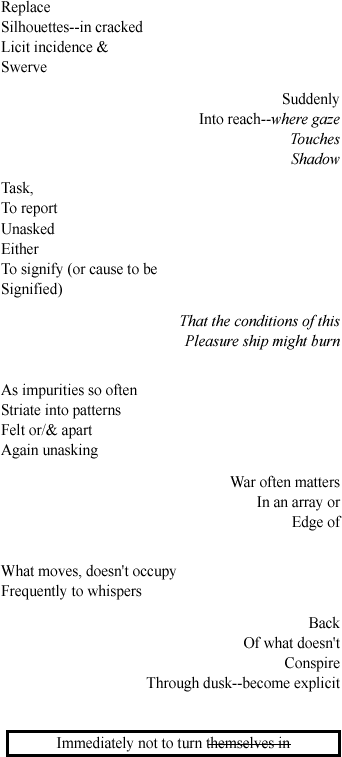| |
Mark DuCharme
Notes:
"A Statement of Sorts"
I feel
resistant to the project of self-definition, insofar as
it implicates a (to me, fake) singularity--just in that
I don't like being pinned down to one modus operandi, one
persona, one set of rules. Also, if I can choose (which
I'm not always so sure about), I prefer the dialogic, or
even better the polylogic, as modes/ models for poetic practice.
I would reject the notion of poetics as an internally consistent
system, which, in my case, has never been even a desirable
goal. At the same time, I would propose that my poetics
is precisely that which values the liberatory, or any persistent
openness to possibilities, at the expense of tedious effort
which is both born of, & often leads to, even more tedious
consistency. "I" as a set of competing possibilities.
Whitman's sense of containing multitudes--although I'll
admit there is not much else I get directly from him--seems
at least a useful (re-)starting point.
I find
that first- and second-person subject positions often refract
through my work. This is sometimes mildly embarassing--even
as I'm aware that an utter lack of "actors" can
lead to a text which is (at least grammatically) static.
That is, while I see expressive or autobiographical approaches
as problematic &/or uninteresting, I'm drawn to the energy
which the "I" and the "you" can bring
to the poem--& my work is, in part, an exploration of ways
of using these figures outside of such arbitrary frameworks.
The "I" is just as likely to be the "you"
in the next line of an exchange. The "I," in this
sense, is no more stable than the point-of-view of the speaker,
author or dictator. If I try in my work to foreground the
provisionality of subject positions, this is done in an
explicitly "lyrical," rather than narrative, context.
(Although I admire artists, such as Acker, Harryman or Godard,
who use narrative almost as a means of disrupting it, this
is not a direction I've sought out in my own work, perhaps
because of my preference for the "immediacy" of
the lyrical, which might be thought of as a persistence
toward starting again). I've written at greater length on
the lyric, in a talk titled "Radical Lyricality"
which was published in the journal 26 thanks to the
good graces of Avery Burns. The early poems in The Betweens,
coincidentally, were written at about the same time as I
was preparing that talk.
The
Betweens is a serial poem, and seriality is an instrument
I've returned to now and again in my writing. While the
singular poem often has to be stunning, the series, perhaps
due to the interlocking nature of its parts, is capable
of incorporating the incidental and the fragmentary, thus
giving it a potentially broader sway while retaining what
seems to me the principally interesting feature of the lyric:
that one is constantly (because writing new poems) starting
over. In fact, the serial poem is a monster which occupies
an intermediate position between the flighty lyric & the
weightier, more "definitive" (and constraining)
longer poem. Lyric and serial poems are like participants
in guerilla, rather than conventional, warfare. They are
flexible, transitive, dialogic--perhaps even interactive--but
always mobile; and these are features which can lend
greater critical distance, while at the same time involvement
in, whatever materials are at hand.
Because
all art of any value is an exchange not just with the reader,
but with--what? the "greater" society upon which
one (often vainly) hopes to have any impact--the poet really
does not have the last word upon the meaning or scope of
their project. Therefore, any "statement" such
as this one is subject to revision, not so much by the author
as by the work's historical reception & cultural resonance(s).
The
blanks at the edge of the page are there to be filled in.
|
from The
Betweens
FOOTNOTE TO
SUDDEN
To arrange
chronologically;
To foster
Even at this late hour, shards
In bundles, slumping
To sputter, cruelly representative
Driven toward, in various incidents
What used to be viable torched
Much of which couldn’t not be heard
Or written in, brand-
New: fledged, irritant, primping
To be welded at the analogy
In full view of the authorities;
To become one with the authorities
(Evident swaying at the alarm)
Sequels: to put in sequences;
Manically erased.
The work is the idea of the work is always
The work or having to carry it
Off though in the meantime folded
Into the work the work is doing it
To the work as in little pieces
Of the work fucking the work over
& Over stray connects over timely
Work & stray dots per inch attuned
To remove through folded pieces doing it
Shattered as if to carry the fucking
Or the idea of the
fucking
The fucking engorges the work is shattered
Shattered pieces
timely
EXERCISE

Mark
DuCharme is author of Cosmopolitan Tremble
(Pavement Saw Press, 2002). His poetry and essays are recent
or forthcoming in BirdDog,
Conundrum, Fulcrum, LA Review, Morkville, Muse
Apprentice Guild, New Review of Literature, Poems for
Peace, Pom2, VeRT, 26: A Journal of Poetry and Poetics,
and 88: A Journal of Contemporary American Poetry.
|
|
|

